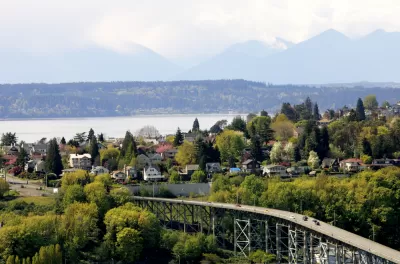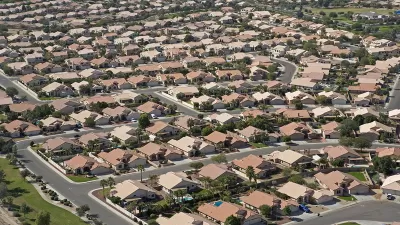To fight the growing housing crisis, most King County residents support an end to single-family zoning and accelerated housing development, according to a new poll.

A poll of King County residents shows that a "slim majority" support ending single-family zoning in Seattle neighborhoods, reports Gene Balk in the Seattle Times.
The survey presented the 501 respondents with questions about several approaches to alleviating the region's affordable housing shortage. While 55 percent supported increased density in the city, slightly fewer—51 percent—supported the change in nearby suburban neighborhoods.
The fight over single-family zoning has been raging in communities across the country as cities and states move to eliminate the designation that affordable housing advocates often call "exclusionary zoning," drawing attention to the more affluent nature of most single-family neighborhoods. Last October, in an effort to acknowledge diverse existing housing forms and lay the groundwork for zoning reform, the city of Seattle moved to rename single-family zoning to 'neighborhood residential' zoning. But opponents argue that rezoning can impact neighborhood character, increase demand for limited on-street parking, and put a strain on local roads and other infrastructure.
In what Balk calls an "interesting twist," 83 percent of respondents said they would prefer to live in a single-family home themselves. But for those who can't afford it, advocates say accelerated development is needed to make housing in the region more affordable, and 63 percent of residents want to see more housing on "underdeveloped" land. However, less than half of surveyed residents wanted to see reduced parking requirements for new construction, despite indications that parking requirements raise the cost of housing and induce car ownership and congestion.
FULL STORY: Survey shows most King County residents likely open to ditching single-family zoning

Trump Administration Could Effectively End Housing Voucher Program
Federal officials are eyeing major cuts to the Section 8 program that helps millions of low-income households pay rent.

Planetizen Federal Action Tracker
A weekly monitor of how Trump’s orders and actions are impacting planners and planning in America.

Ken Jennings Launches Transit Web Series
The Jeopardy champ wants you to ride public transit.

Crime Continues to Drop on Philly, San Francisco Transit Systems
SEPTA and BART both saw significant declines in violent crime in the first quarter of 2025.

How South LA Green Spaces Power Community Health and Hope
Green spaces like South L.A. Wetlands Park are helping South Los Angeles residents promote healthy lifestyles, build community, and advocate for improvements that reflect local needs in historically underserved neighborhoods.

Sacramento Plans ‘Quick-Build’ Road Safety Projects
The city wants to accelerate small-scale safety improvements that use low-cost equipment to make an impact at dangerous intersections.
Urban Design for Planners 1: Software Tools
This six-course series explores essential urban design concepts using open source software and equips planners with the tools they need to participate fully in the urban design process.
Planning for Universal Design
Learn the tools for implementing Universal Design in planning regulations.
Heyer Gruel & Associates PA
Ada County Highway District
Institute for Housing and Urban Development Studies (IHS)
City of Grandview
Harvard GSD Executive Education
Toledo-Lucas County Plan Commissions
Salt Lake City
NYU Wagner Graduate School of Public Service





























